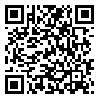Volume 9, Issue 1 (7-2021)
jmsthums 2021, 9(1): 56-64 |
Back to browse issues page
Download citation:
BibTeX | RIS | EndNote | Medlars | ProCite | Reference Manager | RefWorks
Send citation to:



BibTeX | RIS | EndNote | Medlars | ProCite | Reference Manager | RefWorks
Send citation to:
GH V, H K, H R, M A. Comparison the effect of telephone counseling with question and answer and educational CD and pamphlets on self-care behaviors of patients with type 2 diabetes. jmsthums 2021; 9 (1) :56-64
URL: http://jms.thums.ac.ir/article-1-930-en.html
URL: http://jms.thums.ac.ir/article-1-930-en.html
1- Student of Community Education in the Health System, Mashhad University of Medical Sciences, Mashhad, Iran
2- Department of Medical Surgical Nursing, School of Nursing and Midwifery, & Department of Medical Education, School of Medicine, Mashhad University of Medical Sciences, Mashhad, Iran
3- Assistant Professor, Department of Nursing, School of Nursing and Midwifery, Torbat Heydariyeh University of Medical Sciences, Torbat Heydariyeh, Iran
4- Assistant Professor, Department of Public Health, School of Health, Torbat Heydariyeh University, Torbat Heydariyeh, Iran
2- Department of Medical Surgical Nursing, School of Nursing and Midwifery, & Department of Medical Education, School of Medicine, Mashhad University of Medical Sciences, Mashhad, Iran
3- Assistant Professor, Department of Nursing, School of Nursing and Midwifery, Torbat Heydariyeh University of Medical Sciences, Torbat Heydariyeh, Iran
4- Assistant Professor, Department of Public Health, School of Health, Torbat Heydariyeh University, Torbat Heydariyeh, Iran
Abstract: (4657 Views)
Background & Aim: Diabetes is a major public health problem. The self-care behaviors' training is one of the important factors in the control of this disease. Therefore, this study was conducted to compare the efficacy of two educational methods including telephone counseling with questions and answers and educational CD and pamphlets on self-care behaviors in patients with type 2 diabetes.
Methods: This quasi-experimental study was conducted on 50 type 2 diabetes patients randomly assigned to two groups that were trained by telephone counseling with questions and answers and pamphlets with CDs. The statistical population included patients over 30 years’ old who referred to Bala Khaf Comprehensive Rural Health Service Centers in 2020. Data were collected at the beginning of the study and two months after the training through valid and reliable questionnaires. Data analysis was performed using SPSS 21.
Results: The mean age of the patients receiving telephone counseling and the educational pamphlet were 61.76 ± 9.38 and 58.64 ± 6.80, respectively. Women comprised 60% of the study population. There was a statistically significant difference between the two groups in self-care behaviors. The mean score of the self-care behaviors were higher in one of the groups receiving telephone counseling with questions and answers (p <0.001). This difference was also observed in the patients’ self-care subscales (p <0.05).
Conclusion: Telephone counseling training with questions and answers was more effective on self-care behaviors of patients with type 2 diabetes. It is suggested that this educational method can be used to change the self-care behaviors of these patients.
Methods: This quasi-experimental study was conducted on 50 type 2 diabetes patients randomly assigned to two groups that were trained by telephone counseling with questions and answers and pamphlets with CDs. The statistical population included patients over 30 years’ old who referred to Bala Khaf Comprehensive Rural Health Service Centers in 2020. Data were collected at the beginning of the study and two months after the training through valid and reliable questionnaires. Data analysis was performed using SPSS 21.
Results: The mean age of the patients receiving telephone counseling and the educational pamphlet were 61.76 ± 9.38 and 58.64 ± 6.80, respectively. Women comprised 60% of the study population. There was a statistically significant difference between the two groups in self-care behaviors. The mean score of the self-care behaviors were higher in one of the groups receiving telephone counseling with questions and answers (p <0.001). This difference was also observed in the patients’ self-care subscales (p <0.05).
Conclusion: Telephone counseling training with questions and answers was more effective on self-care behaviors of patients with type 2 diabetes. It is suggested that this educational method can be used to change the self-care behaviors of these patients.
Type of Study: Research |
Subject:
General
Received: 2021/05/7 | Accepted: 2021/06/27 | Published: 2021/07/10
Received: 2021/05/7 | Accepted: 2021/06/27 | Published: 2021/07/10
Send email to the article author
| Rights and permissions | |
 | This work is licensed under a Creative Commons Attribution-NonCommercial 4.0 International License. |






